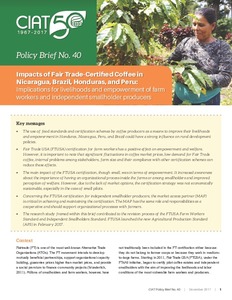Impacts of Fair Trade-Certified Coffee in Nicaragua,Brazil, Honduras, and Peru: Implications for livelihoods and empowerment of farm workers and independent smallholder producers.
Context:
Fairtrade (FT) is one of the most well-known Alternative Trade Organizations (ATOs). The FT movement intends to develop mutually beneficial partnerships, support organizational capacity building, guarantee prices higher than market prices, and provide a social premium to finance community projects (Wunderlich 2011). Millions of smallholders and farm workers, however, have not traditionally been included in the FT certification either because they do not belong to farmer coops or because they work in medium to large farms. Starting in 2011, Fair Trade USA (FTUSA), under the FT4All initiative, began to certify pilot coffee estates and independent smallholders with the aim of improving the livelihoods and labor conditions of the most vulnerable farm workers and producers.
Certification schemes promote enhanced welfare of certified producers and increased environmental sustainability, and there is growing interest in understanding their effectiveness. In rich and emerging economies, consumers are willing to pay higher prices for coffee, cocoa, and other certified agricultural products that guarantee a sustainable production process and enhance producers’ and workers’ livelihoods (Chiputwa et al., 2015). Indeed, FTUSA Standard involves four principles: empowerment, economic development, social responsibility, and environmental stewardship. However, the impact of food standards and certification schemes on the welfare of rural workers and farmers has been widely discussed and is still subject to an ongoing debate.
Based on FTUSA concepts and principles related to independent smallholder producers’ (IS) and farm workers’ (FW) welfare and empowerment, and the Theory of Change (ToC) of FT4All pilots an assessment of the efectiveness of this ToC was conducted by the International Center for Tropical Agriculture (CIAT) through the research project “Measuring and assessing impacts of Fair Trade for All on farmers, farm workers, and the overall Fair Trade market system,” supported by the Ford Foundation and Keurig Green Mountain.

